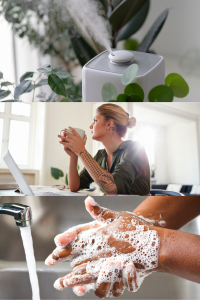-
Summer Savings: Save 20% On LASIK , Find More
*Must mention this promotion and be treated in August of 2024 to qualify. 20% off standard price of Wavelight procedure. Cannot be combined with any other offers.
Why Are My Eyes Itchy?
Common Causes of Itchy Eyes
Itchy eyes are a prevalent issue that many individuals face. The causes can range from environmental factors to underlying medical conditions. Here, we delve into the most common causes:
Allergies
Allergic reactions are a primary cause of itchy eyes. Pollen, dust mites, pet dander, and mold can trigger allergic conjunctivitis, leading to symptoms like itching, redness, and watering.
Dry Eye Syndrome
Dry eye syndrome occurs when the eyes do not produce enough tears or when the tears evaporate too quickly. This condition can result from aging, medications, or environmental factors, causing persistent eye discomfort and itching.
Eye Strain
Prolonged use of digital screens without adequate breaks can lead to digital eye strain, manifesting as itchy, dry, and fatigued eyes.
Contact Lens Mismanagement
Improper contact lens hygiene plays a significant role in eye irritation. Infrequent replacement, inadequate cleaning, and neglecting to change solution can lead to a buildup of allergens and bacteria on the lenses, triggering itchiness.
Symptoms Associated with Itchy Eyes
Identifying the symptoms that accompany itchy eyes is crucial for proper diagnosis and treatment. Common symptoms include:
- Redness and swelling of the conjunctiva
- A gritty or burning sensation
- Excessive tearing or discharge
- Sensitivity to light
- Blurred vision
Effective Treatments for Itchy Eyes
Addressing itchy eyes involves a combination of home remedies and medical treatments. Below are several effective strategies:
Over-the-Counter Medications
Antihistamine eye drops can alleviate allergy-induced itching. Lubricating eye drops or artificial tears can provide relief for dry eye syndrome.
Prescription Treatments
For severe cases, a healthcare provider may prescribe stronger medications such as corticosteroid eye drops, which reduce inflammation.
Lifestyle and Home Remedies

Implementing lifestyle changes can significantly reduce eye discomfort:
- Use a Humidifier: Adding moisture to the air can help combat dry eyes, especially in arid environments.
- Follow the 20-20-20 Rule: Every 20 minutes, look at something 20 feet away for at least 20 seconds to reduce eye strain.
- Maintain Cleanliness: Regularly washing hands and avoiding touching the eyes can prevent infections and reduce allergy symptoms.
Preventative Measures
Preventing itchy eyes involves proactive measures to minimize exposure to irritants and maintain eye health:
- Allergy Management: Identify and avoid allergens. Use air purifiers and keep windows closed during high pollen seasons.
- Proper Hydration: Ensure adequate hydration by drinking plenty of water, which supports tear production.
- Eye Protection: Wear sunglasses to protect against UV rays and reduce exposure to wind and dust.
When to Seek Medical Attention

While itchy eyes are often manageable with home remedies, certain situations warrant medical attention:
- Persistent Symptoms: If symptoms persist despite over-the-counter treatments.
- Severe Pain or Vision Changes: Immediate evaluation is necessary if there is significant pain, vision loss, or intense redness.
- Recurrent Infections: Frequent eye infections require a professional assessment to determine underlying causes.
Itchy eyes can significantly impact daily life, but understanding the causes and implementing effective treatments can provide relief. Through proper diagnosis, medication, lifestyle adjustments, and preventative measures, individuals can maintain optimal eye health and comfort.
YOU MIGHT ALSO LIKE...
VISION CENTERS NEAR ME
Enter your zip code, city, or a doctor name below to find a vision center.
Find out if LASIK is right for you
Congratulations!
Your vision issues can most likely be corrected with a LASIK procedure. Schedule a free consultation today.
Answer 5 simple questions to see if you are a candidate
What is your age group?
Do you wear...
With corrective lenses, do you have...
Have you ever been told that you have astigmatism?
Have you ever been told that you have dry eyes?
Request an Information Kit
Learn about your surgeon, the latest advanced technology, procedures, options and benefits, financing options, and what to expect from your LASIKPlus experience.









